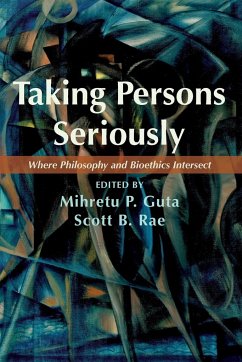
Taking Persons Seriously
Versandkostenfrei!
Versandfertig in 1-2 Wochen
54,99 €
inkl. MwSt.

PAYBACK Punkte
27 °P sammeln!
This volume attempts to show why ontology matters for a proper grasp of issues in bioethics. Contemporary discussions on bioethics often focus on seeking solutions for a wide range of issues that revolve around persons. The issues in question are multi-layered, involving such diverse aspects as the metaphysical/ontological, personal, medical, moral, legal, cultural, social, political, religious, and environmental. In navigating through such a complex web of issues, it has been said that the central problems philosophers and bioethicists face are ethical in nature. In this regard, biomedical sc...
This volume attempts to show why ontology matters for a proper grasp of issues in bioethics. Contemporary discussions on bioethics often focus on seeking solutions for a wide range of issues that revolve around persons. The issues in question are multi-layered, involving such diverse aspects as the metaphysical/ontological, personal, medical, moral, legal, cultural, social, political, religious, and environmental. In navigating through such a complex web of issues, it has been said that the central problems philosophers and bioethicists face are ethical in nature. In this regard, biomedical sciences and technological breakthroughs take a leading role in terms of shaping the sorts of questions that give rise to ethical problems. For example, is it ethical to keep terminally ill patients alive on dialysis machines or artificial ventilators? Is it ethical to take someone's vital organs upon death and transplant them into another person's body without any prior consent from the deceased person? Reproductive techniques also raise complicated ethical issues involving in vitro fertilization, contraceptives, prenatal testing, abortions, and genetic enhancements. Moreover, biomedical issues raise ethical problems regarding research on human subjects, stem cell research, and enhancement biotechnology. The beginning and end of life issues bring up their own complicated ethical conundrums involving, among other things, terminating life support and euthanasia. This book approaches such complex bioethical questions by engaging in ground-level debates about the ontology of persons. This is a nonnegotiable first step in taking steps forward in seeking a plausible solution(s) for the complex ethical problems in bioethics.














